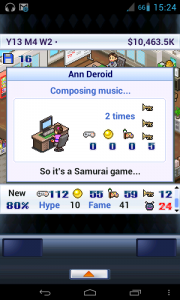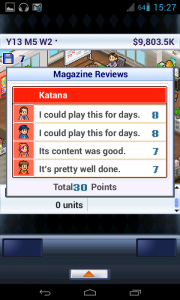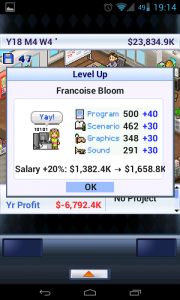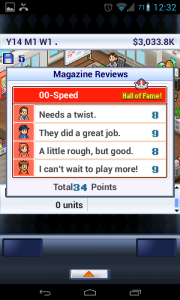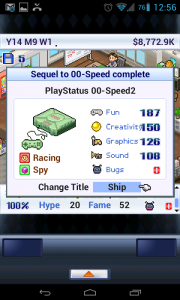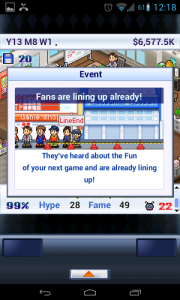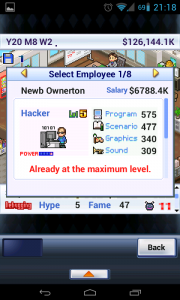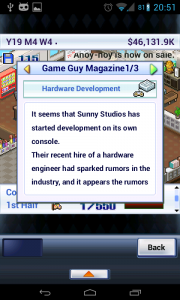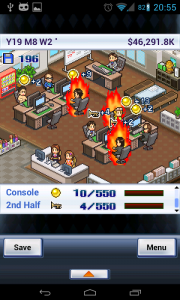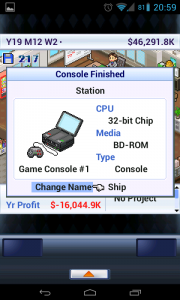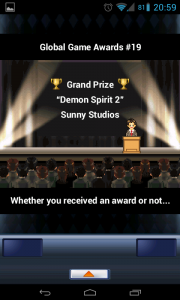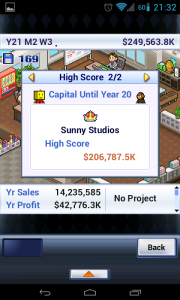During the last week, I’ve used all of my time waiting in lines, or for someone, or for a train, to play Game Dev Story. I actually managed to get to the end of it, and what an end it was!
All of this happened during the week between May 6th and May 12th of 2013.
This really is the awesome aspect of mobile games. Even the PSP or the DS can’t offer the ability to play in short bursts in such a great way. Sure, I can pause Grandia whenever I want, but if I’m in the middle of some dialogue, or even in the middle of a big quest, or even just exploring a dungeon, I won’t have a great time when I come back to it. I’ll be lost, it’ll take a while before I figure out what’s going on and I’ll lose out on part of the experience.
With games like Game Dev Story, this just isn’t the case. I can pause and stop playing whenever I feel like it because the whole game consists of “micro” mechanics. It’s like progression is somehow separated from the game. Several times, the game crashed on me, but I didn’t feel like losing out, because even if the auto-save was a while ago, even if the progression I had to go through was progression I’ve already been through, the progression itself was fun.
I’m not sure if this is a good thing, or if the game just plays on some part of my brain to trick me, but it works and I perceive it as having fun, so for now, I’m OK with it. It’s basically Hill Climb Racing all over again, except even better.
I need a little disclaimer here. I’ve said the game is crashing on me, but it’s extremely likely this isn’t the game’s fault. I have an HTC HD2. This is a Windows Mobile 6.5 Phone, which I rooted and installed Android 4.1.2 on. Everything crashes on it, but I still prefer it to Windows Mobile 6.5. I can’t say with confidence that any software I’ve tried on it is unstable on its own. Hill Climb Racing wasn’t crashing when I played it, but back then, I had the previous version of Android, which was far more stable, so that doesn’t mean anything. If you’re interested in rooting your own phone, that’s an extremely complex topic, so I won’t go there. I’ll just say to go to the XDA Developers forums and start your research.
So let’s finally get to the game, shall we?
I Started Taking Risks
During my first week of Game Dev Story, I was playing conservatively. I saved money, being careful not to go bankrupt, constantly playing it safe. I also didn’t understand the mechanics very well. After a while, I saw this wasn’t getting me far, so I decided to mix it up a bit.
I started buying licenses. First, it was the SNES clone license. It’s called the Super IES here, because the parent company is called the Intendro. I bought it in the middle of its life-cycle so it didn’t last very long, but it was worth it. Whichever game I made, it sold much better than it would on the PC. Then, it was the GameKid, which lasted quite a long time, but I didn’t make a lot of games on it.
The big license I bought was the Sonny PlayStatus. I think it’s pretty obvious which real world console this is supposed to be. I scored big time with the PlayStatus. I started making millions upon millions, giving me even more courage to take risks.
I Hired a Hacker
That’s when I paid 3.5 million for the best hiring option and I got lucky with it. One of the potential hires was a Hacker. I had no idea which role a hacker was supposed to fill, or how you can get one through training, but eventually, I figured out that the Hacker is one of the ultimate jobs an employee can have.
Francoise Bloom (a girl Hacker, because the name doesn’t make it obvious), had all of her stats in the high 200s and low 300s. She was absolutely amazing, so I figured she’s got to be worth her 800 a year. It’s way cheaper than outsourcing parts of the game anyway. Even better, she still had training left in her, so I could further increase her stats without bumping her paycheck yet.
I Got into the Hall of Fame
With Francoise on my team, I finally managed to make a Hall of Fame game. I’m not sure what the exact score requirement is, but 00-Speed, a Spy Racing game gained a total of 34 points in reviews and this was enough. This means it got two 9s and two 8s, so I’m guessing that’s as low as it can go. Then again, I never got anything between that and 30, so I can’t be sure.
Since I had a Hall of Fame game, I could now also make sequels, but I didn’t want to do this yet. I assumed that it works like in real life. I thought that pumping out sequels in Game Dev Story too fast makes you lose fans, so I decided to wait.
I didn’t wait too long, though.
I Made a Sequel
I made one new game and started work on a sequel right after that one. I might be wrong here, but it looks like when you make a sequel, you start out with a bunch of points in all four categories, so you get a bit of an advantage. There are risks to, though. If the sequel doesn’t make it to the Hall of Fame, you aren’t able to make any more sequels for that franchise. However, this never happened to me. Each and every one of my sequels reached Hall of Fame status without any difficulty, so it I guess it’s not a huge risk.
I Started Gaining Fans
With more money in the bank, I was able to invest in advertising and conventions more, so I started gaining fans like crazy. This meant more sales, more money, more staff training and promotions, basically more of everything. Sunny Studios turned into a snowball and started getting big fast.
I Figured out Some of the Mechanics
Throughout all of this, I started figuring some things out. With each game you make, you get to spread some points between different aspects of the game, such as Innovation, Polish, Realism, etc. There’s a limited amount of points you can get, but as the company progresses, you get more of them, but I didn’t know how or why. Well, I figured it out!
How to get Direction Points in Game Dev Story?
To get Direction points, you need to level a theme or a genre to level 5. Each and every time this happens, I got 2 more points to distribute.
More points meant I could make better and better games, which further amplified the snowball effect. It also meant I had more money to waste, and waste I did.
I Promoted my Star Employee
I decided to spend some money on Newb Ownerton. This guy was one of my first employees and he started out as a Coder. I trained him as high as I could, to the point where none of the basic and most of the advanced training wouldn’t give him any points. Then, I started promoting him.
First, he became a level 5 coder. Then, I bought a career change manual and turned him into a designer. After that, he was a sound engineer and a writer to. Throughout all of this, I kept training him as high as I could, but there was a problem. Each promotion bumped his paycheck by 20 percent. I was earning big time, so this wasn’t an issue, but in hindsight, I should have just outright hire someone else.
Still, I didn’t understand how the job roles worked, so I thought I might unlock a secret role. This never happened, though. The four basic job roles unlocked the Producer and the Director. As far as I understand, the Producer is an advanced Designer/ Writer, while the Director is more of a Coder/Sound Engineer. However, they also mostly get higher values overall, it’s just that they focus more on two at a time.
After these two roles, I unlocked a new one, I think by getting a Director to level 5. The new role was Hardware Engineer and it’s been mentioned in the game already – it was the role I needed to develop a console, something I wouldn’t be doing yet.
Finally, after a lot of money, and a lot of research points, Newb Ownerton became a Hacker – the job I already had with Francoise. The difference was, Newb Ownerton’s stats were a bit higher and his salary was way higher. I was paying Francoise 800k at level 1 and a bit more than twice that at level 5. Newb Ownerton, on the other hand, wasn’t satisfied with that.
Thanks to all of his promotions, Newb Ownerton was getting close to 4 million as a level 1 Hacker and around 6.7 million at level 5. He was getting paid about as much as all of my other employees combined at the end of the game, and about 3 times all of my employees combined when I got him to max level. Was it worth it?
Probably not. There was no other job role after I got the Hacker, even with all the other roles maxed out. Maybe you can unlock a new job some other way, but getting an employee through all of the available career paths wasn’t one of them. I would have been better off just outright hiring another Hacker.
So that’s what I did.
I Hired
Once the money started rolling in, 3.5 million for recruitment was spare change, so I started recruiting big time. I hired Hackers, Producers and Directors left, right and center. Hackers are overall the best employees, but apparently, you need at least a level as a writer to be able to write a design document for a game and, since I couldn’t take a look at employee details before hiring them, I decided to hire a few of the minor roles to, just to be safe.
I ended up replacing most of my lower level employees, because all of them also had low energy, but I decided to stick with Newb Ownerton. He was costing me a ton, but I never got anyone even close to his stats, so I was worried I might start losing fans if my games drop in quality when I fire him.
I Developed a Console
Once I got to 100 million, I decided to invest half of that to develop a 32 bit BD-ROM console. I didn’t go with the best options out there, because that would have cost me more than I had, but since I was getting close to the twentieth year, which is when the game ends, I decided to take the risk. I called it the Station.
How Does Console Development Work in Game Dev Story?
With my employees, console development lasted about 6 to 8 months. It goes in two phases. In the first one, I had to get 550 of each fun and graphics. It pretty much worked just like game development, except I couldn’t use stat boosting items.
In the second phase, I had to get 550 of each creativity and sound. This worked in the exact same way. Finally, I was able to name my console and release it.
I didn’t get a lot of money out of it, at least not as much as I expected, but on the plus side, I didn’t have to pay for the license to develop on it, so I came out way on top.
I Pushed to the End
With two more years left, I started investing into sequels, employee training and advertising. I got Newb Ownerton and Francoise Bloom to Level 5. Newb had Writer levels, so he was able to make design documents, which means these two got way overused, but even so, they got me a lot of game points.
By far my best franchise was Demon Spirits. I made a total of four, with Demon Spirits 4 getting released about 4 months before the end of the twentieth year. This ended up being my record-selling game, but only after the game was over, so ZOO Knights 2, an animal RPG, ended up being my top game. Demon Spirits 2, 3 and 4 all ended up getting the Grand Prize for the best game, though.
During the 20 years, I released 62 games with a total of close to 200 million units sold. My top capital was 206 million and Demon Spirits 4 ended up selling close to 30 million units after Game Dev Story Was over.
What I can do now is to start a new game, with all of my genre and theme levels transferring over. This means I could technically advance even further, just to see how far I can get. I guess the true end would be when I max out on direction points and honestly, I every probably will play it for a while longer. For now though, I’m marking Game Dev Story as completed.
Game Over!
